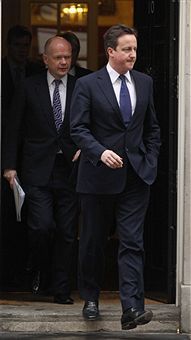 With a UN resolution now passed, Prime Minister David Cameron has displayed diplomatic
skills his critics believed he did not possess. As NATO is planning to enforce an expansive no-fly zone over Libya, it is worth pausing for a moment to consider such a mission’s aims and to learn
the lessons from recent wars.
With a UN resolution now passed, Prime Minister David Cameron has displayed diplomatic
skills his critics believed he did not possess. As NATO is planning to enforce an expansive no-fly zone over Libya, it is worth pausing for a moment to consider such a mission’s aims and to learn
the lessons from recent wars.
The strategic aim of the mission cannot only be to protect Libyan civilians. Framed in this way, the international community will face the same problems it did Bosnia: for instance, the Srebrenica massacre happened while a no-fly zone was already in place. A no-fly zone will not force Colonel Ghadaffi from power. As troops are not going to be deployed, it will be very difficult to force regime change unless NATO is willing to bomb Ghadaffi’s heavily-protected bunker in Tripoli, which is unlikely.
Therefore, the strategic aim should be to protect and bolster the opposition and pressure loyalist forces to the degree that a political process can begin, which eventually forces Colonel Ghadaffi and his family from power, but allows for some kind of interim power-sharing between loyalists and rebels. The fact that Ghadaffi has managed a fightback in the last two weeks is a sign that he does have a broader base of support than Tunisia’s Ben Ali did.
Ignoring this, even if NATO manages to help the rebels roll back Ghadaffi’s forces is to ignore the lessons of Afghanistan. There the West found that once the Taliban was defeated they – and the forces they represented – were excluded from having a stake in the polity, leaving them no choice but to fight. The West must avoid this happening again in Libya.
To prepare for such a political process, the Arab League should appoint an envoy to work alongside the UN envoy. Crucially, NATO states should be clear that it may take a long time to force a settlement. Ghadaffi may be even better ensconced than Slobodan Milosevic, so they should prepare for more than the 78 day campaign than over Kosovo.
Those nations who will lead the effort – Britain and France – must also continue to keep those who opposed military action, including Germany, Turkey, Russia, Algeria and China, inside the political process. Excluding them will give Ghadaffi hope and could undermine the action. Foreign Secretary William Hague should make it a priority to work with these states, perhaps even appointing an envoy for the task, someone like Lord Hannay perhaps.
The final lesson concerns the aftermath. If everything goes wrong, Libya could be an Afghanistan inside an Iraq: a tribally-fractured country with a history of political violence, but enough natural resources to keep a civil war going for years. The FCO and DfiD should, with the help of the cross-government Stabilisation Unit, set up a Future of Libya Task Force, much as the State Department did in the run up to the Iraq War. It should bring in outside experts to plan for what a democratic Libya should look like and focus on what the UK would want to plug into an eventual locally-run process. Such a Task Force could start as a British set-up or even as a Anglo-French organisation and then be extended to include other allies.
Now that action is a matter of days away, David Cameron and Nicolas Sarkozy, who have led the international community, must set realistic aims for the use of force, plan for a political process, counsel patience, and keep the coalition as broad as possible. There are many lessons from recent wars. Now that the global community has ignored the false one – never intervene – they should heed the real ones.






Comments